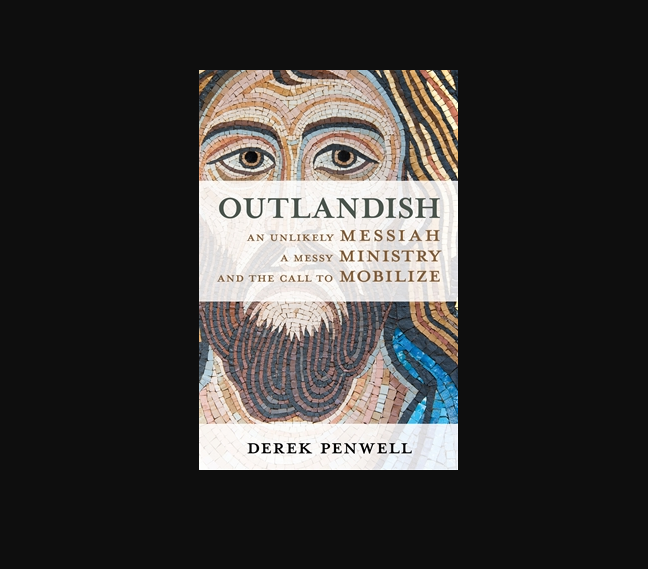by Rosalind Hughes
Outlandish: An Unlikely Messiah, A Messy Ministry, and the Call to Mobilize, by Derek Penwell, is published by Chalice Press.

I just this minute finished reading Outlandish: An Unlikely Messiah, A Messy Ministry, and the Call to Mobilize by Derek Penwell, which is good timing as the book releases today. (I was privileged to read a copy of the final pre-press draft.)
Penwell (and may I just say, what a great name for an author!) has written a book based on the urgent realization of Jesus’ political reality, a realization sharpened and made more urgent by recent political events surrounding those of us in the United States of America. While that framework is roughed out from the beginning, the body of the book takes its time to establish the case for a political Jesus who is interested in the bodies and spirits of the people living and breathing before him, at least as much as in the state of their eternal souls.
The tone draws rather deliberately on the snark of modern online political (and religious) debate, except when it gets deep into a bit of biblical digging, which the author obviously enjoys. But to continue on the topic of tone, I appreciated the extended argument for the use of sarcasm as a discipleship tool. Skewering broods of vipers, after all, is quite biblical.
While his thesis is present throughout, it’s really in the final couple of chapters that Penwell pulls the reader round to considering in practical terms what it means to read Jesus as a political leader, and resurrection as a definitive judgement on the world order, for one (or a community) that considers themselves a follower of Jesus:
“The vocation of Jesus’ followers after Easter places them squarely in the middle of the political fight to protect the most vulnerable, while holding to account those who’ve dedicated themselves to … themselves, and the pursuit of their own aggrandizement.”
That’s quite a bridge from the empty tomb to the empty rhetoric of too many modern politicians, and the empty pockets, and empty papers, of too many people within their principalities.
There is even a list of practical tips for getting involved with social justice movements and communities. I can see this being useful not only for individual readers, but for churches, especially social justice committees or leadership groups, that might read the book together.
A word about Penwell’s interpretation of the Lord’s Prayer, in Chapter 3. In my tradition, when we pray that prayer (which we do only all the time), we ask forgiveness of our trespasses, or of our sins, rarely of our debts. So Penwell’s assertion that when we ask forgiveness of our debts we are literally begging for our freedom from economic oppression (and promising not to inflict it on anyone else); and following that up with the idea that to ask God to deliver us from the time of trial and evil is to ask for freedom from very present oppressive systems of injustice – that definitely gave me pause. Took my breath away a little, to be honest.
Of course, the implication is that if we are asking God to deliver us from systems that we the people have organized around ourselves (or one another, or just those others), then we had better get to work answering our own prayers, with God’s help. And I think that’s the point of the book: to galvanize faithful, Christlike engagement with the powers that be, following in the footsteps of an outlandish messiah.
The Rev Rosalind Hughes is Rector of Church of the Epiphany in Euclid, OH., is a contributing editor at the Episcopal Cafe and blogs at Over the Water

